In the West African nation of Ghana, Scania is collaborating with Deutsche Gesellschaft für Internationale Zusammenarbeit (GIZ) GmbH, a German agency for sustainable development, to train women as bus or truck drivers in six months. Even though this is not always an easy path, the project empowers participants and offers them new prospects and development opportunities. Three of the women trained through the project share their experiences.
Harriet Nyahe laughs out loud in response to the baffled follow-up question: what is a trotro? Nyahe, who is from Ghana, explains that just two years ago, she was still driving the streets of the capital city of Accra, selling tickets for a privately run share taxi. While driving around in the trotro—a type of minibus, as it turns out—the 32-year-old Nyahe advertised tickets and sold them directly from the window of the vehicle. This was a dangerous and not very lucrative job that she was able to quit once she started her vocational training at the West African Transport Academy (WATA).
Great interest in vocational training
Harriet Nyahe is now one of around 140 women who have been trained at WATA as bus or truck drivers. The vocational training center was established in 2016 under the auspices of Scania and Deutsche Gesellschaft für Internationale Zusammenarbeit (GIZ) GmbH, a German agency for sustainable development, and creates new development opportunities for the participants. With the help of a program designed especially for women, the aim is to improve the overall level of education and training for women, thus promoting gender equality. The offer has been well received – but successful graduates must meet the challenge of asserting themselves in the strongly male-dominated transportation industry in African countries. The demand for training was impressive from the very beginning, recalls the GIZ project manager Johanna Moss: “As early as the first week, we had nearly 400 applicants who were interested in the program. There was an enormous demand.”
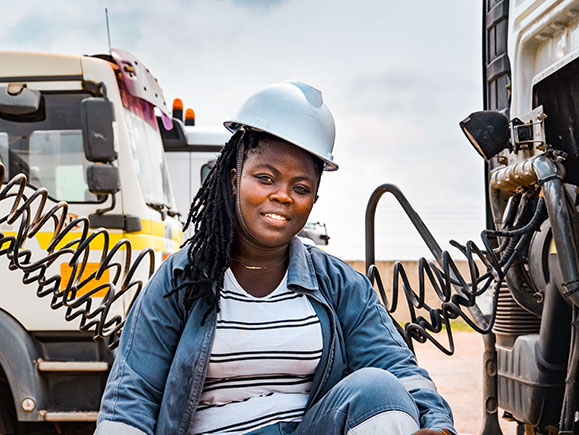
After completing her vocational training successfully, Harriet Nyahe now transports kerosene.
400Around 400 women applied during the first week.
Harriet Nyahe, Grace Adomako, and Oye Lewis are all among the African women who have successfully completed the training thus far. Just like many other participants, both Adomako and Lewis had completely different professions before their participation in the WATA program and had no prior experience. Lewis had worked in the water trade and Adomako was a pharmaceutical assistant. Now they are well-trained and sought-after drivers. Many of the women find a job directly after completing training.
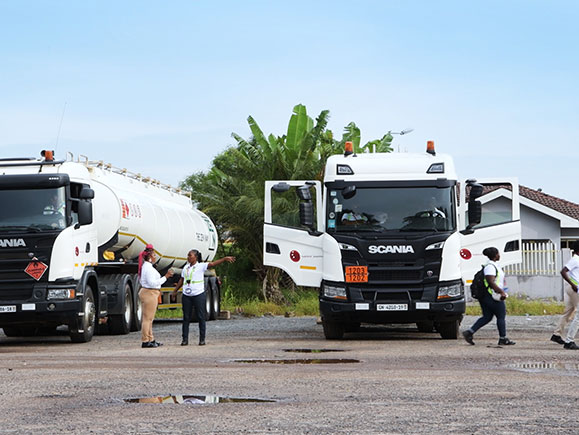
After their training, some of the women drive fuel trucks on behalf of a large mineral oil and natural gas company.
To provide optimum support for the women on their path to a new career, Scania and GIZ place particular importance on hiring skilled personnel from the region to train the selected candidates. “However, locating qualified instructors in the country was challenging,” remembers Johanna Moss. “But ultimately we found them where we least expected. We were able to secure the support of retired security experts”—who had been trained by the German police when they were in active duty. “That was a stroke of luck,” says Moss. “The instructors were already familiar with Germany’s dual education system, which closely connects theory and practice and is also used here.” Haroen Gyselinck, Head of WATA at Scania West Africa, adds: “It was very important for us to adopt a systematic approach to vocational training. Many of the women didn’t even have a driver’s license.”
That was also true for Grace Adomako. She remembers the first day at the wheel: “In the beginning, driving a large city bus felt strange, but I really wanted to succeed.” The great motivation displayed by Adomako was a common trait among all participants, as Gyselinck reports: “Not one of them missed a single day of vocational training.” Adomako has long since overcome her initial uncertainty and gained self-confidence. Since successfully completing her six-month training, Adomako, who is married and has two children, now works as a bus driver in Accra, Ghana’s capital. While she is busy transporting passengers to their destinations and earning money for her family, her husband looks after their children. In this way, the couple demonstrates that traditional role models can change and gender equality is possible — given the right conditions.
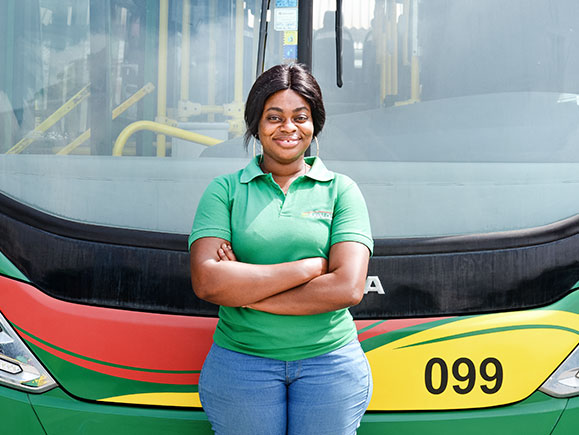
Grace Adomako is as motivated in her work as she was during her training at WATA.
“In the beginning, driving a large city bus felt strange, but I really wanted to succeed.”Grace Adomako
WATA-trained bus driver from Ghana
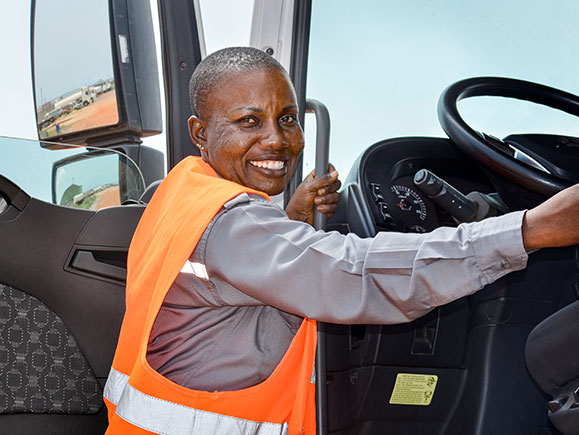
Oye Lewis particularly appreciates the independence her new career as a truck driver gives her.
Initial skepticism among male coworkers
But not all men have shown this level of understanding for the women’s work and their aspirations to achieve equality and independence. Oye Lewis and Harriet Nyahe, who now both transport kerosene to the airport as truck drivers, dealt with gender-based prejudice and disapproval from male drivers, particularly in the beginning. “We want to support ourselves and have good jobs,” says Oye Lewis. “In the beginning, the men did not accept our desire for equal rights, and put obstacles in our way.”
“We want to support ourselves and have good jobs.”Oye Lewis
WATA-trained truck driver from Ghana
With the help of a training course specially developed by GIZ, Oye Lewis and her peers learned how they could counter their male colleagues’ behavior: which situations can be avoided in advance? How do I behave if I am confronted? Who can I go to for support? “The women faced these challenges with an impressive level of conviction,” emphasizes Johanna Moss. “That was a constant source of motivation for us and showed just how important this project was and still is."

A Scania bus, like the one driven by Grace Adomako, in service in the capital of Ghana, Accra.

Valuable ally
Esenam Nyador is an important ally and ambassador for the project. A nationally known activist, she joined the project early on and even went one step further than her peers in the driver’s seat: after she participated in the program, she herself began to train women at WATA to become bus and truck drivers. Nyador, who is 43 and runs her own taxi company on the side, remains very committed to promoting equal opportunities for men and women in transportation. She sums it up perfectly: “My goal is to increase the number of women at the wheel in transportation. Based on my own experience, I know how challenging it is to become established in a male-dominated business.”
Impact beyond Ghana
The dedication and commitment of all the participants have paid off. Following in the footsteps of numerous successfully trained drivers, 26 more women will soon begin their vocational training in Ghana. Moreover, the success of WATA is serving as a model for additional projects throughout western Africa. For example, Scania is planning to launch a similar project in Côte d'Ivoire in 2021. The aim here will be to offer training for both men and women equally in the areas of maintenance and upkeep as well as vehicle operation. In both countries, these are projects focusing on sustainable development that are intended to help the region’s people find safe, income-generating, permanent jobs through targeted vocational training regardless of gender. Both participants have expressed interest in pursuing a new cooperation between GIZ and Scania in the future.
WATA
West African Transport Academy
The West African Transport Academy (WATA), founded in 2016, is Ghana’s first vocational training facility that focuses specifically on the transportation sector. Professional drivers for buses and trucks as well as mechanics are trained in Tema, located 25 kilometers east of the capital city of Accra. The project is a collaboration between Scania and Deutsche Gesellschaft für Internationale Zusammenarbeit (GIZ) GmbH, a German agency for sustainable development, each of which contributed 45 percent of the initial costs amounting to around €2.7 million. The GIZ is implementing the project as part of the develoPPP.de program on behalf of the Federal Ministry for Economic Cooperation and Development (BMZ). With the program, BMZ is promoting its commitment to the private sector at the crossroads where corporate opportunities and the developmental need for action meet. As part of specific projects, develoPPP.de supports companies that invest sustainably in developing and emerging nations – in terms of funding and expertise. The automotive supplier Bosch is another project partner.
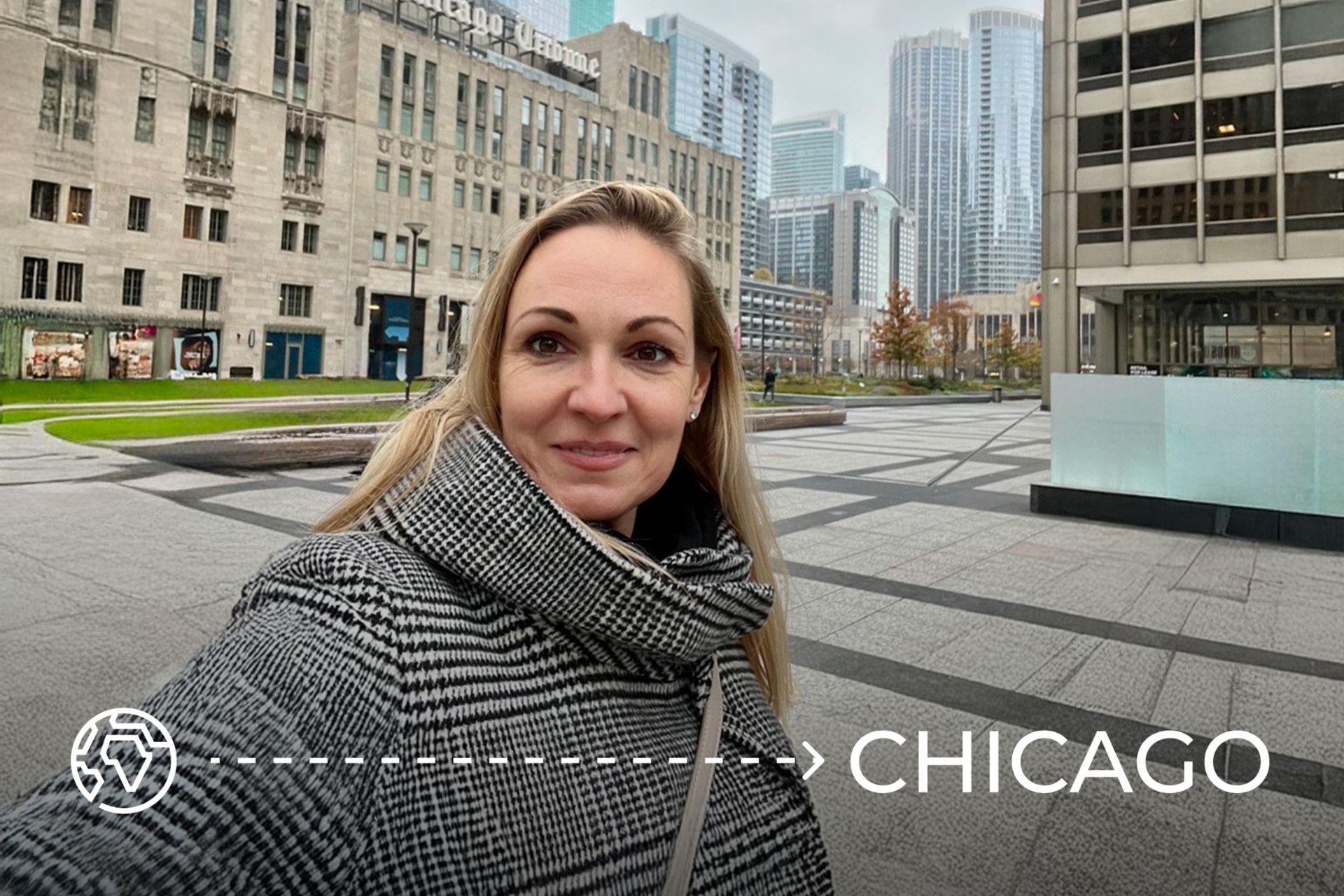


.jpg/jcr:content/Teaser-Grafik-Tiva-Sharifi-3840x2560-V1-(1).jpg
)
.jpg/jcr:content/Teaser-Grafik-Mansoureh-3840x2560-V1-(1).jpg
)


